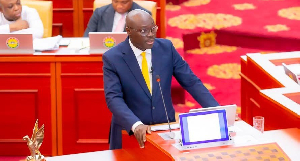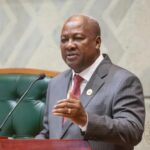Government’s newly presented budget outlines a series of ambitious interventions intended to address public concerns around jobs, food security, and energy access. Central to the plan are high-impact programmes designed to boost employment, consolidate economic stability, and achieve universal household electrification beginning in 2026.
Key policies include government-led purchasing of excess farm produce to minimise post-harvest losses, with some of the food redirected to support student feeding programmes. The budget further proposes the activation of Farmer Service Centres equipped with mechanised tools to modernise agriculture, as well as the establishment of a 1,200 MW state-owned power plant fuelled by gas from the Offshore Cape Three Points (OCTP) field.
Presenting the 2026 Budget and Economic Policy Statement to Parliament, Finance Minister Dr. Cassiel Ato Forson sought approval for GH¢357.105 billion in expenditure and permission to mobilise GH¢268.1 billion in revenue and grants—an increase from the GH¢226.5 billion target for 2025.
Presenting the budget themed “Resetting for Growth, Jobs, and Economic Transformation 2026,” the Finance Minister noted that the Resetting Agenda has been structured around three fundamental pillars that will guide the government’s economic direction.
“Restoring hope and trust in our democracy, in public institutions and in the ability of every Ghanaian to fulfil their potential; extending a trusted hand to the vulnerable, especially women and the youth, while laying the foundation for a more inclusive and compassionate economy; and stimulating demand and productivity through the 24-Hour Economy and Accelerated Export Development Policy, which promotes Made-in-Ghana goods, expands jobs and keeps our economy active, day and night.”
According to Dr. Forson, the government intends to commit GH¢30 billion toward the 2026 Big Push infrastructure plan, which he described as the most significant investment in national infrastructure in recent memory.
The allocation will not only accelerate existing projects but also cover two major additions: the Accra–Kumasi Expressway, meant to ease travel and trade between the two cities, and the Ekye Amanfrom–Adawso Bridge, expected to improve connectivity across the Afram Plains.
He also disclosed an emergency release of GH¢200 million to the National Food Buffer Stock Company to mop up excess food on the market. The move aims to stabilise prices, reduce waste, and protect the income of farmers, particularly those in food crop and poultry production.
He told Parliament, saying the Education Ministry, GETFund, School Feeding Programme, Free SHS Secretariat and Buffer Stock Company must ensure full compliance.
“Mr Speaker, President Mahama has also directed all schools, from basic to secondary, to purchase rice, maize, chicken and eggs produced in Ghana only.”
Energy-related Sector Project
Dr. Forson told Parliament that government will, in 2026, introduce the Rural Electricity Acceleration and Urban Intensification Initiative to ensure every unserved or underserved community gets connected to the national grid. The project will follow a Turnkey Implementation Model to speed up and streamline delivery, while boosting rural development and supporting the 24-Hour Economy.
He added that fast-growing areas where homes, schools and businesses remain without power will benefit from the Electricity Intensification Programme to expand access.
“Mr Speaker, this initiative will extend service lines, transformers, and distribution poles to unserved and underserved homes and enterprises, ensuring that the benefits of electrification reach every Ghanaian family, Over a period of four years from 2026 to 2029, all 16 regions will be covered under the initiative in a sequenced and results-oriented approach that guarantees regional balance and prevents project fragmentation.
Mr Speaker, in 2026, government will commence the implementation of this initiative, starting with the Volta, Oti, Savannah and Central regions,” he mentioned.
The minister noted that the programme would further be strengthened through the deployment of off-grid solar solutions to remote and inaccessible areas, particularly island communities.
According to Dr. Forson, energy is central to Ghana’s transformation agenda, and the government is committed to repositioning the power sector so that it ceases to be a constraint and instead becomes a strategic advantage for homes, factories and businesses.
He claimed that dependable, reasonably priced, and sustainable energy would be the engine that propels the 24-hour economy, powers business, illuminates neighborhoods, and generates employment.
The finance minister stated that the government was developing a Gas-to-Power Strategy to switch from the expensive light crude oil for power generation to cleaner, domestically produced natural gas through audacious reforms, strategic investments, and astute management.
He said that doing so would lower generation costs by at least 75%, improve energy security, and be in line with climate obligations. It would also lessen the financing deficits in the energy sector and their budgetary impact on the budget.
“Mr Speaker, we have also secured a firm agreement with the OCTP partners, led by ENI, for an additional 80 million standard cubic feet (mmscf) of gas per day of new gas supply. Government has also agreed with the Jubilee Partners to increase gas production by 70mmscf of gas per day”.
Dr. Forson stated that in order to take advantage of the substantial gas flow, the government has established a project implementation committee to guarantee the quick construction of Ghana Gas Processing Plant Two (GPP 2), a second gas processing facility that would accept the gas from the Jubilee partners.
“Beginning 2026, the government will commence the construction of a 1,200-megawatt state-owned thermal power plant to offtake the additional 150mmscf of gas per day from the OCTP partners and GPP 2″.
Dr. Forson emphasized that the new gas plant would contribute to a stable and cost-effective power supply, securing the nation’s energy future.
The government will also explore the potential for small-scale hydropower by commissioning feasibility studies on the Red Volta and other southern river systems as part of efforts to diversify electricity generation.
Initiatives in the Agriculture Sector
Dr. Forson highlighted that, given agriculture’s central role in the nation’s economy, President Mahama has set in motion a comprehensive plan to modernise the sector, anchored on the Agricultural Transformation Programme and the 24-Hour Economy and Accelerated Export Development Programme.
As part of the Farmer Service Centres initiative, the government will deploy over 4,000 units of agricultural machinery to 50 districts. The equipment includes tractors, tractor-trailers, mini-tractors, mini-tractor trailers, mineral fertiliser spreaders, and four-row precision seed drills, aimed at boosting productivity and mechanising farming activities nationwide.
“Our farmers have always carried Ghana on their shoulders. With these investments, we are returning the favour, giving them the tools, technology, and support to carry the nation into a future of food security and prosperity,” he explained.
Oil Palm Development (2026–2032)
Dr. Forson said government plans to develop 100,000 hectares of oil palm plantations, creating over 250,000 jobs, boosting palm oil self-sufficiency, exports, and promoting inclusion for women and youth.
The initiative will turn Ghana’s “Red Gold” into a driver of industrial growth, rural prosperity, and foreign earnings, backed by a $500 million financing facility in partnership with the World Bank, DFIs, and DBG.
He added that the Accra–Kumasi Expressway and Ekye Amanfrom–Adawso Bridge are being added to the Big Push Infrastructure Programme following completed feasibility studies.
Dr. Forson called the Accra–Kumasi Expressway a flagship of the Big Push Infrastructure Programme and Ghana’s first six-lane bi-directional Class A expressway, spanning 198.7 km.
The project will cut travel distance by over 50 km, reduce transport costs by nearly 40%, and create 30,000+ jobs. It will feature eight interchanges and three major bridges, improving connectivity and easing urban congestion.
He added that the Adawso–Ekye Amanfrom Bridge and road networks will open up the Afram Plains to commercial agriculture, unlocking its economic and agricultural potential.
Dr. Forson highlighted that the 2026 budget includes a World Bank-supported initiative to build 1,000 km of agricultural enclave roads over three years.
Addressing Parliament, he noted that inadequate road infrastructure linking key food-producing areas to markets is a significant contributor to food price inflation. “Government is therefore committing to a three-year programme to construct 1,000 km of agricultural enclave roads,” he said.
Key allocations in the 2026 budget include:
– GH¢110m – 24-Hour Economy
-GH¢245m – Nkoko Nketenkete livestock programme
-GH¢6.9bn – Oil palm development
-GH¢828m – 1,000 km agricultural enclave roads
-GH¢690m – Farmer Service Centres
-GH¢100m – Aquaculture development
Other significant allocations:
-GH¢2bn – Rural Electricity Acceleration & Urban Intensification (Phase One)
-GH¢4.2bn – Free Secondary Education
-GH¢537m – “No-Fee-Stress” policy
-GH¢25m – Free Tertiary Education for PWDs
-GH¢292m – Sanitary Pads for Girls initiative
-GH¢2.3bn – Ghana Medical Care Trust (MahamaCares)
-GH¢600m – Three new regional hospitals
-GH¢100m – Completion of 10 Agenda 111 hospital projects
These allocations cover education, agriculture, energy, and health, reflecting government’s focus on jobs, human capital development, and infrastructure expansion.






